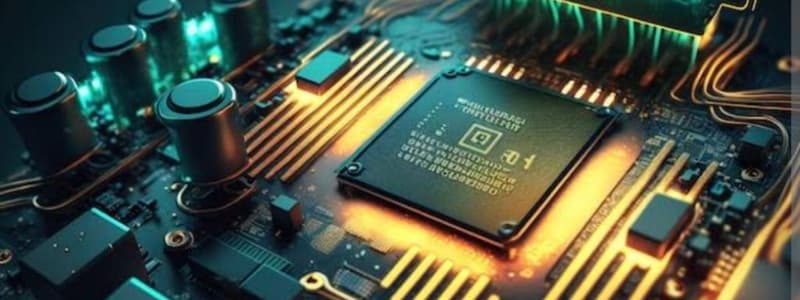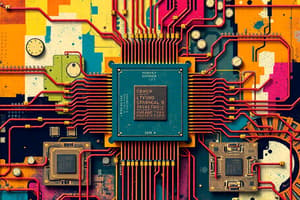Podcast
Questions and Answers
What is the primary function of the Memory Address Register (MAR)?
What is the primary function of the Memory Address Register (MAR)?
- To store the results of an arithmetic operation
- To buffer data between the CPU and memory
- To store the memory address from which data will be fetched (correct)
- To hold the instruction being executed
What is the purpose of the Memory Data Register (MDR)?
What is the purpose of the Memory Data Register (MDR)?
- To store the program counter
- To buffer data between the CPU and memory (correct)
- To hold the instruction being executed
- To perform arithmetic operations
What is the role of the Program Counter?
What is the role of the Program Counter?
- To buffer data between the CPU and memory
- To store the instruction being executed
- To perform arithmetic operations
- To hold the memory address of the next instruction to be executed (correct)
What type of data can be carried by the Data Bus?
What type of data can be carried by the Data Bus?
What is the primary function of the Control Bus?
What is the primary function of the Control Bus?
What is the first step in the Fetch Decode Execute Cycle?
What is the first step in the Fetch Decode Execute Cycle?
What occurs during the Decode step of the Fetch Decode Execute Cycle?
What occurs during the Decode step of the Fetch Decode Execute Cycle?
What is the purpose of Primary Storage, also known as Main Memory?
What is the purpose of Primary Storage, also known as Main Memory?
What is the primary function of the Control Unit in a CPU?
What is the primary function of the Control Unit in a CPU?
What is the purpose of the Arithmetic Logic Unit (ALU) in a CPU?
What is the purpose of the Arithmetic Logic Unit (ALU) in a CPU?
What is a key feature of the Von Neumann architecture?
What is a key feature of the Von Neumann architecture?
What is the primary function of the Accumulator register?
What is the primary function of the Accumulator register?
What is the purpose of the Current Instruction Register (CIR)?
What is the purpose of the Current Instruction Register (CIR)?
What is a key characteristic of the Von Neumann architecture?
What is a key characteristic of the Von Neumann architecture?
What is the role of Registers in a CPU?
What is the role of Registers in a CPU?
What is a feature of the Von Neumann architecture?
What is a feature of the Von Neumann architecture?
Flashcards are hidden until you start studying
Study Notes
Computer Architecture
- Computer architecture is the organisation of components that make up a computer system and the operations that guide its function.
Von Neumann Architecture
- Consists of a single, shared memory for programs and data, a single bus for memory access, an arithmetic unit, and a program control unit
- Features include a central processing unit, direct access to memory, stored programs made up of instructions that can be executed in sequential order, and computer memories that can store programs as well as data
Components of CPU
Arithmetic Logic Unit (ALU)
- Carries out arithmetic and logic operations on operands in computer instruction words
- Can be divided into two units: an arithmetic unit (AU) and a logic unit (LU)
Control Unit
- Acts as the brain of the CPU, controlling and managing the execution of instructions
- Determines the sequence of operations, directs the flow of data, and ensures proper coordination among different components
Registers
- Small storage units inside the CPU that hold data, instructions, and the current status of the processor
- Essential for enabling the CPU to execute tasks quickly and efficiently
Current Instruction Register (CIR)
- Temporarily stores the instruction currently being executed by the processor
- Holds the instruction fetched from main memory
Accumulator
- A register or memory location used to store intermediate results of arithmetic and logical operations
Memory Address Register (MAR)
- Stores the memory address from which data will be fetched to the CPU registers or the address to which data will be sent and stored via system bus
Memory Data/Buffer Register (MDR)
- Holds the information fetched from main memory
- Operates as a buffer between CPU and memory
Program Counter
- Holds the address of the next instruction to be executed in memory
System Bus
Address Bus
- Carries addresses throughout the computer system between the processor and memory
Data Bus
- Carries data from processor to memory, which can be an address, instructions, or numerical value
Control Bus
- Carries signals from control bus to all other computer components
- Carries the clock's pulses
Fetch Decode Execute Cycle
- The process used by a computer's CPU to run instructions
- Each cycle retrieves an instruction from memory (fetch), translates it into a series of commands (decode), and then performs the required action (execute)
Fetch
- Retrieves the instruction from memory at the address specified by the program counter (PC)
- PC is then incremented to point to the next instruction in memory
Decode
- Splits the instruction into operand and opcode to determine what type of instruction needs to be carried out
Execute
- Performs the actual computation or manipulation of data
Memory Unit
- Primary storage/memory, also known as main memory
- Stores current data, programmes, and instructions
Studying That Suits You
Use AI to generate personalized quizzes and flashcards to suit your learning preferences.




